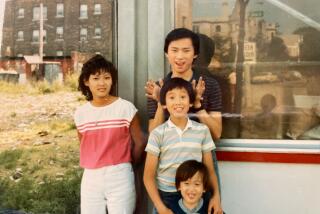Texas prisons ban books by Langston Hughes and Bob Dole - but ‘Mein Kampf’ is OK
- Share via
If you’re one of the more than 140,000 people doing time in a Texas state prison, you’re not allowed to read books by Bob Dole, Harriet Beecher Stowe or Sojourner Truth. But you’re more than welcome to dig into Adolf Hitler’s “Mein Kampf” or David Duke’s “My Awakening.”
The Texas Department of Criminal Justice has banned 15,000 books from the correctional facilities it operates, most recently Dan Slater’s new “Wolf Boys: Two American Teenagers and Mexico’s Most Dangerous Drug Cartel,” the Guardian reports.
The news comes in the middle of Banned Books Week, the annual event celebrating literature that’s been targeted by censors.
Deborah Caldwell-Stone of the American Library Assn., a Banned Books Week sponsor, blasted Texas’ decision to ban “Wolf Boys,” about two Texas teenagers who go to work for the Zetas, an infamous Mexican drug cartel, and are caught and sentenced. The book is nonfiction: Both teenagers are housed in Texas prisons.
“It’s truly tragic,” Caldwell-Stone said. “There is probably a new story every day like this.”
Jason Clark, a spokesman for the Texas prison system, said Slater’s book was banned because it violates the department’s ban on books that contain information about criminal schemes.
Clark pointed to a passage in the book that reads: “Mario purchased pickup trucks from which he removed panels and lights. The trick was packing the drugs in a part of the vehicle where the body wouldn’t lose its hollow sound when slapped.”
Slater criticized the decision by prison officials to prevent prisoners from having access to his book in a piece in Slate.
“TDCJ has let its book-banning policy go far beyond what is necessary, permitting uneducated mailroom officers and Huntsville administrators to censor speech on political grounds or simply block books from going to inmates that prison workers do not like,” Slater wrote, referring to the city where the prison system headquarters is located. “If what matters is balancing security with free speech and the rehabilitation of inmates, no policy could be more errant.”
Slater noted that the TDCJ book bans often seem arbitrary. The department has banned many nonfiction books dealing with prison rape, he writes, but does not censor Stephen King’s “Rita Hayworth and the Shawshank Redemption,” which contains a scene in which an inmate is sexually assaulted.
Books containing the “N-word” are often targeted by prison censors, Slater writes. This has led to the banning of books by Langston Hughes, Noam Chomsky, Philip Roth, Richard Wright and Salman Rushdie.
But racist manifestos by Adolf Hitler and David Duke have not been banned by the TDCJ.
It’s unclear why some books ended up on the list of banned materials.The Guardian reports that the list of disallowed books includes “World War II: An Illustrated History of Crisis and Courage” by Bob Dole, the former Republican senator, and “Ana’s Story: A Journey of Hope” by Jenna Bush Hager, the daughter of former President and Texas Gov. George W. Bush.
A 2011 report by the Texas Civil Rights Project notes that books can be banned in Texas prisons for any of six reasons, including “sexually explicit images” and encouraging “deviant criminal sexual behavior.” Books can also be censored for containing information on “criminal schemes.”
Many literary classics have ended up censored in Texas prisons, the report says, including Dante’s “Inferno,” Alice Walker’s “The Color Purple” and Henry Miller’s “Tropic of Cancer.”
Contemporary authors aren’t safe either. The TDCJ has prohibited books by popular writers such as Tom Clancy, John Grisham, James Patterson and Lisa Scottoline.
“Wolf Boys” author Slater called the TDCJ’s censorship procedures “aggressive and arbitrary.”
“It’s like we’re living in the Dark Ages,” Slater told the Guardian.“I believe strongly in the power of knowledge and enlightenment and in what books can do, especially for someone who is down and who feels a connection to a story.”
ALSO
At a Houston museum filled with coffins and hearses, it’s time for ‘Death 101’
How two police shootings of black men sent Tulsa and Charlotte in different directions
More to Read
Sign up for our Book Club newsletter
Get the latest news, events and more from the Los Angeles Times Book Club, and help us get L.A. reading and talking.
You may occasionally receive promotional content from the Los Angeles Times.









